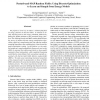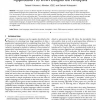1339 search results - page 53 / 268 » Learning Functions from Imperfect Positive Data |
166
click to vote
ICCV
2011
IEEE
14 years 2 months ago
2011
IEEE
We propose a novel way to induce a random field from an energy function on discrete labels. It amounts to locally injecting noise to the energy potentials, followed by finding t...
134
Voted
PAMI
1998
15 years 2 months ago
1998
—This paper concerns an efficient algorithm for learning in the limit a special type of regular languages called strictly locally testable languages from positive data, and its a...
125
Voted
ENGL
2007
15 years 2 months ago
2007
In this paper we introduce a finite automaton called partial finite automaton to recognize partial languages. We have defined three classes of partial languages, viz., local pa...
108
click to vote
EVOW
2010
Springer
15 years 6 months ago
2010
Springer
A challenging problem in bioinformatics is the detection of residues that account for protein function specificity, not only in order to gain deeper insight in the nature of functi...
139
Voted
AMAI
1998
Springer
15 years 2 months ago
1998
Springer
Overgeneralization is a major issue in the identification of grammars for formal languages from positive data. Different formulations of generalization and specialization strate...



